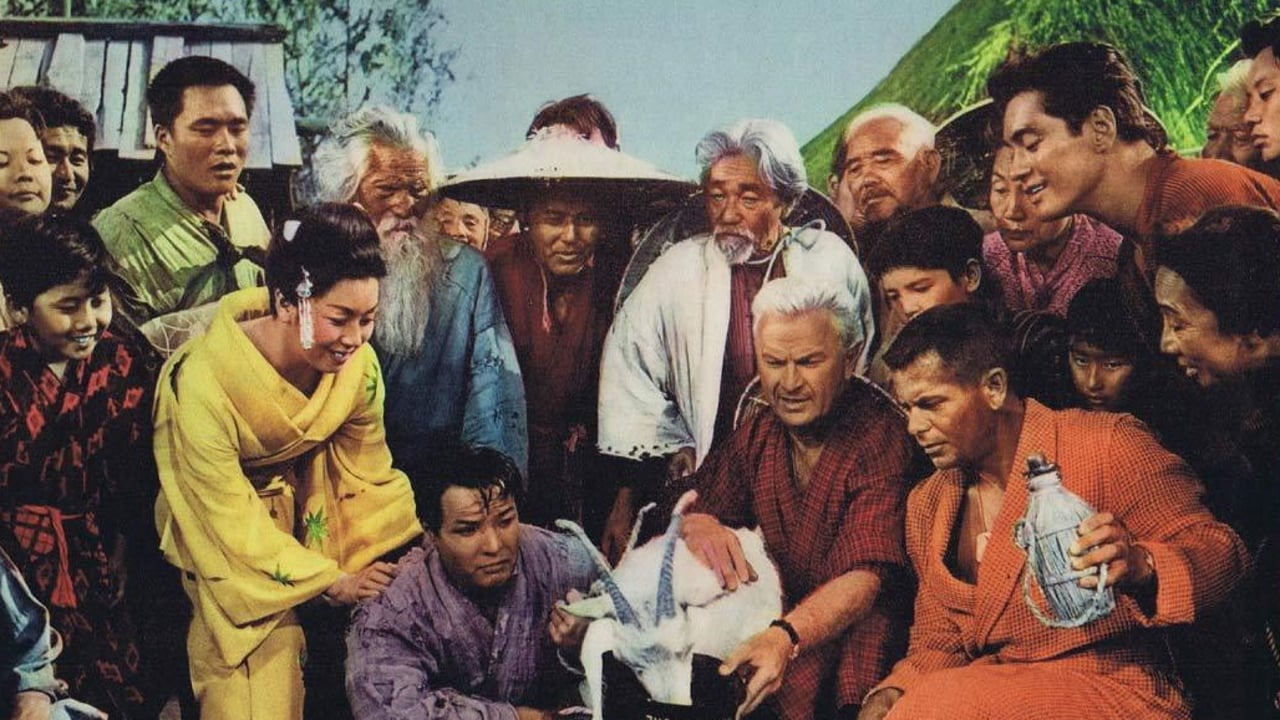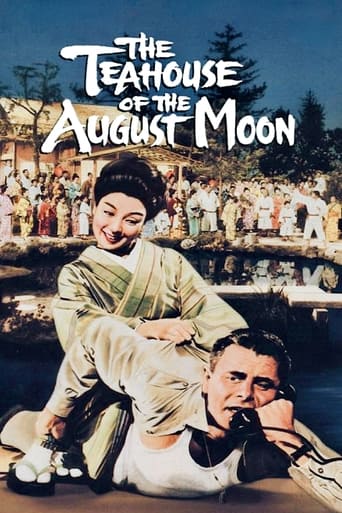



What makes it different from others?
The film makes a home in your brain and the only cure is to see it again.
View MoreIt's funny, it's tense, it features two great performances from two actors and the director expertly creates a web of odd tension where you actually don't know what is happening for the majority of the run time.
View MoreThe movie turns out to be a little better than the average. Starting from a romantic formula often seen in the cinema, it ends in the most predictable (and somewhat bland) way.
View Moretried it again recently on tcm; so bad couldn't stay but dipped in again later and still terrible: story of recent post-war GIs goofed by locals is hackneyed; so is script; it tries to be funny but isn't really, and then loses it trying to show the perils of occupation- and how human the Japanese really are; yeah, if you want to forget the little tidbits like officers practicing beheadings of GI prisoners at the stern of a ship; great funny stuff for the movie? oh, not quite; and movie-wise it is almost a stage play filmed, incredibly static, phony backdrops, just dreadful; so lets say you tuned in just for brando- normally a good enough reason; holy cow- between the makeup, done as much as they could native Japanese, the put on accent, afraid it's akin to jolsen in blackface
View MoreThis film made me realize how much we've lost as a country since the 1950s. According to Wikipedia at least, the book, play, and film were enormously popular for about 25 years, when political correctness set in, and liberals were oh-so-terribly aghast at Marlon Brando playing an Okinawan with a heavy accent. But it's Brando's character who is the most admirable in the movie -- sharp, perceptive, and cunning, but also warm, generous, and forgiving.All told, it's the Okinawans who come off well -- it is we Americans who seem rather ridiculous, with our notions of winning hearts and minds and spreading democracy. Remember that this film was made just ten years after WWII, when we were up against the Soviet Union, and democracy and "the American way" were at the heart of what we thought we were all about. But here is a film that completely satirizes, if not ridicules, all that, and yet it was enormously popular. Perhaps I'm looking at it through rose-tinted lenses -- there may well have been the Michael Savages and Rush Limbaughs of the day who inveighed against the Hollywood liberals seeking to undermine American resolve in the face of the Soviet threat and disgracing the memory of those who had died in WWII. But I think, more accurately, it was a time of greater American self- confidence, when we were able to laugh at ourselves more easily, and weren't terrified that this, that or another group might be ticked off. In short, this is a wise movie that should be seen by all those in power who have anything to do with how we conduct ourselves toward other nations and peoples -- as well as anyone who wants to see an entertaining but also educational film.
View MoreThis is one of my all-time favorite movies. It is G-rated, and while some people might find a couple of mentioned subjects worth adding a P to G, I oppose the idea.1. Racism: The subject of racism is mentioned because the movie is essentially about American soldiers trying to change Asians into Americans; essentially, they emphasize difficulty in the Okinawans learning to speak English, but this does not--in my opinion--make fun of them.2. Prostitution: When a Geisha is brought into the village, it is suggested that she is a prostitute; however, the character Sakini does an excellent job of explaining that a Geisha is definitely NOT a prostitute, and does so keeping the explanation G-rated.3. Drunkeness: Let's face it, in this day and age, alcoholism is so common that mentioning it in a movie is blasé. No problem here.This is--in my opinion--one of the best comedies of the time, and definitely belongs in the genre of Family Film.
View MoreI saw this film when I was 17years old.Brando was King,Paul Ford was Colonel Hall in Sgt Bilko and I was at the Savoy,Brighton with Vivienne Wyman whose dad had a paper shop near the youth club.She had beautiful wavy black hair,a flawless complexion and I was the envy of the boys in the "Coffee Lounge".Life could not get any better.In retrospect not such an unlikely possibility.The war against Japan had only been over 12 years and the "Americanisation" of the rest of the world was on schedule . American largesse had kept Britain afloat both during and after the war;it was by now widespread throughout the "conquered" countries. The Japanese people had been redeemed through defeat and the Americans were prepared to be magnanimous in victory.Military Officers became advisors and democracy was shipped out in bulk whether it was wanted or not.No reasonable person could doubt their good intentions,but imposing an alien culture on the indigenous one is not a seamless process......and the "conquered" people may not be as conquered as you think..... That,in a nutshell,is the premise of "The Teahouse of the August Moon". The Americans poke gentle fun at themselves,Paul Ford does his good-natured bumbler schtick and Marlon Brando has great fun with those actor's friends the funny accent and make - up.There is some cod Japanese philosophy and the average American's ignorance of the rest of the world is lampooned. It was a time when in England we still spoke about "good Germans" (Rommel was a "good German" - Heydrich was not).By the same token,Sakini was a "good" Japanese man.We could not understand the Bushido code,therefore it was "bad".Sakini was cute looking and smiled a lot.You couldn't imagine him starving British P.O.W.s to death. At 17 I thought Brando's portrayal of a Japanese interpreter was brilliant and hilarious.Nearly fifty years later and I can't think of any other European/American actor who could have pulled it off. He was a young man at the height of his powers;rather like a juggler throwing more and more clubs into the air,there seemed to be nothing he could not do. Glenn Ford gets a rare chance to do comedy and reminds us of his versatility.Used to playing men with a past,here he plays a man without much future,at least not in the U.S.Army. Henry Morgan as usual makes every second of his screen time count.A major part in the long-running "M.A.S.H." was just reward for years of playing cops and noncoms in movies. It is pointless to call "The Teahouse of the August Moon" racist because the concept of racism as it exists now did not exist then.And by extension of course Marlon Brando must be racist - a quite ridiculous assertion. It is probably not a film for today;it may well be rediscovered in a more gentle age when the thought police are no longer trying to apply 21st century sensibilities on fifty year old movies. Strangely enough Vivienne didn't find it very funny - perhaps it was a bloke thing.I never got a date with her again.
View More